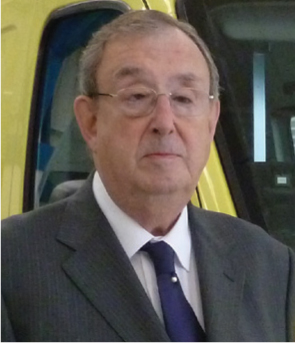
The need for effective and unified emergency medical services in the wake of the recent terrorist shootings in Paris will be one of the underlying messages for delegates at The Larrey Society's first annual conference in London on 21 January.
Sue Noyes, chief executive, East Midlands Ambulance Service NHS Trust, who chairs the conference, has sent this message to the Society's members:
‘The debate around emergency and urgent care is one of the most critical for all of us, whether we are NHS employees or not. The response we receive from our public services when we are in a crisis situation, or a heightened level of anxiety…about our own health or that of our loved family and friends, is a key measure of the effectiveness of a society.
‘Given all of the pressures we face in our world at this time, ensuring we can have the appropriate response to emergency and urgent healthcare needs is one of the most important of all our duties as citizens.’
Two of the speakers have also made pre-conference comments on the pivotal role ambulance providers will have in the nation's 21st century healthcare services.
Professor Jonathan Benger, national clinical director for urgent care, NHS England, and professor of emergency care, University of the West of England, Bristol, said:
‘Healthcare services are in a state of constant change, no more so than EMS. In the UK we are moving from an ambulance service focused on transport to hospital, to an ambulance service that acts as a community-based provider of urgent care, pivotal to the urgent and emergency care system.
‘As we develop and progress it is essential that we communicate and consult with all stakeholders, including EMS staff, other providers and patients to ensure that the changes that we make are the right ones, and will support the best possible outcomes for patients and improved working conditions for staff.
Professor Niri Siriwardena, director, community and health research unit, School of Health and Social Care, University of Lincoln, said:
‘A debate about the future shape of emergency medical services (EMS) is important because continuing changes in primary care and care provided by hospitals, together with changes in delivery of care by ambulance services driven by pre-hospital research and quality improvement initiatives, mean that EMS needs to change also.’
David Davis, founder and chairman of The Larrey Society, will welcome delegates by announcing that 2016 is the 250th anniversary of the birth of Dominique Jean Larrey, the 17th French military surgeon and the acknowledged ‘father’ of the modern ambulance service.
Larrey is the ideal role model for the Society because of his innovation, integrity and his constant willingness to challenge the establishment for the betterment of his patients.
‘These are the principles on which The Larrey Society has been founded and will pursue with vigour, singlemindedness and honesty’ says Davis.
After an opening address by Professor Andy Newton, chairman, College of Paramedics, and honorary president of The Larrey Society, speakers will address key EMS issues.
Professor Benger will pose a series of critical questions: What is the best EMS model for the UK? How do we manage a much greater population of patients who have urgent rather than emergency problems in community settings? How do we design the right service to meet the needs of the population which is not constrained by traditional ways of working? Where are we going in the UK? What skillsets are needed to support the model?
Measuring performance and quality of EMS will be addressed by Professor Siriwardena, and the role of mobile treatment centres for managing alcohol-related issues will be discussed by Pete Brown, resilience officer, South West Ambulance Service NHS Foundation Trust.
Integration of emergency services now and in the future will be the topic of a presentation by Richard Hunt, chair, London Ambulance Service NHS Trust, followed by Clair Carson, acute service line manager, Pennine Care NHS Trust, who will present a case history responding to a mental health crisis by developing a hospital-based street triage service.
Professor Kevin Mackway-Jones, professor of emergency medicine; representative, The Royal College of Emergency Medicine; consultant in emergency medicine; and medical director, North West Ambulance Service NHS Trust, will address the effect of ‘exit block’ on A&Es and the knock-on impact on ambulance handovers.
The question: Is technology the game changer? will be debated by a panel of specialists including Alana Pearson, senior mobile strategy consultant, Mubaloo Limited; Lynda Sibson, consultant editor, Journal of Paramedic Practice and telemedicine manager, Addenbrookes Hospital; Mark Wilson, founder, Good SAM App; and Oriol Badia Radar, chief technical officer, DEA Drones, who will outline the roles and benefits of unmanned aerial vehicles for emergency medical services.
The conference will be held at the Cavendish Conference Centre, Duchess Mews, London, W1G 9D.
Discounted delegate fees are available for members of The College of Paramedics and The Larrey Society.

